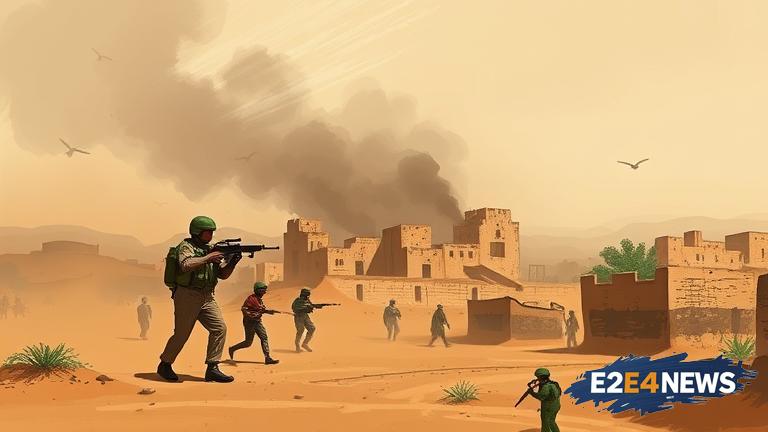The ongoing civil war in Sudan has taken a devastating turn, with the army repelling an attack on North Darfur’s capital, El Fasher. The conflict, which began in 2023, has resulted in widespread displacement, human rights abuses, and a severe humanitarian crisis. The situation in North Darfur has been particularly dire, with the region experiencing a protracted famine that has left millions of people in need of food assistance. The attack on El Fasher was reportedly carried out by rebel groups, who have been fighting against the government for greater autonomy and resources. The Sudanese army has been accused of committing atrocities against civilians, including bombing and shelling of residential areas. The international community has condemned the violence and called for an immediate ceasefire. Despite efforts to negotiate a peace agreement, the conflict shows no signs of abating, with both sides dug in and refusing to compromise. The humanitarian situation continues to deteriorate, with reports of civilians being forced to flee their homes and seek shelter in overcrowded and under-resourced displacement camps. The famine in North Darfur has been exacerbated by a combination of factors, including conflict, drought, and economic instability. The region’s agricultural sector has been severely impacted, with many farmers unable to plant or harvest their crops due to the fighting. The lack of access to basic necessities like food, water, and healthcare has led to a significant increase in mortality rates, particularly among vulnerable populations such as children and the elderly. The international community has pledged to provide assistance, but the response has been hindered by a lack of funding and access to affected areas. The situation in Sudan has been further complicated by the presence of other armed groups, including militias and extremist organizations. The government has been accused of using these groups to carry out attacks on civilians, which has further fueled the conflict. The African Union and the United Nations have called for an immediate end to the violence and for all parties to engage in peace talks. However, the prospects for a peaceful resolution remain slim, with both sides showing little willingness to compromise. The conflict in Sudan has significant regional implications, with the potential to destabilize neighboring countries and create a wider humanitarian crisis. The international community must take immediate action to address the crisis, including providing emergency assistance to affected populations and supporting efforts to negotiate a peaceful resolution. The situation in Sudan is a stark reminder of the devastating consequences of conflict and the need for sustained international engagement to prevent further humanitarian crises. The people of Sudan deserve peace, stability, and access to basic human rights, and it is the responsibility of the international community to support them in achieving these goals. The conflict in Sudan is a complex and multifaceted issue, requiring a comprehensive and sustained response from the international community. The situation demands immediate attention and action, including the provision of emergency assistance, support for peace talks, and accountability for human rights abuses. The people of Sudan will continue to suffer unless the international community takes decisive action to address the crisis. The time for action is now, and the international community must come together to support the people of Sudan in their time of need.
